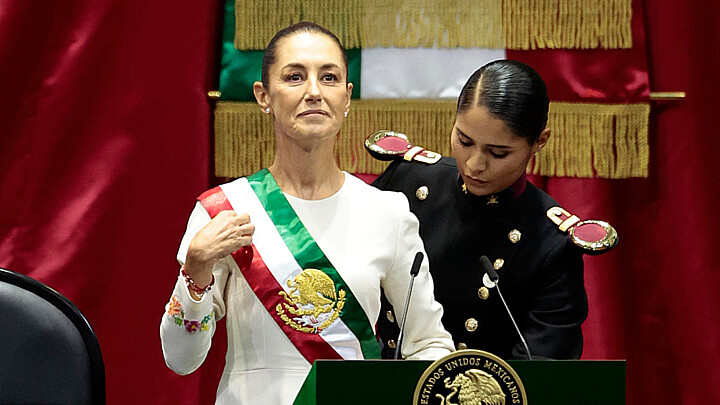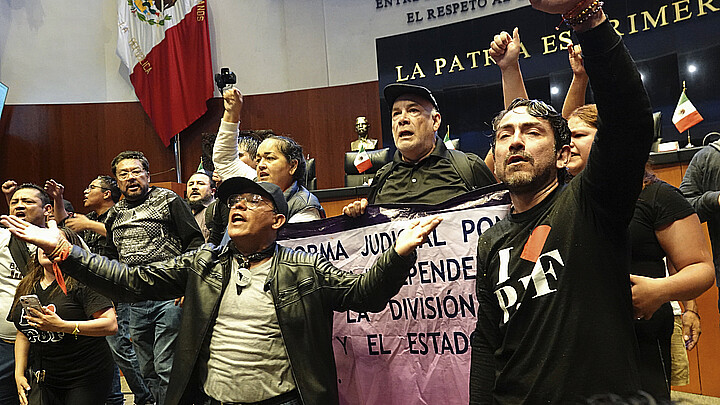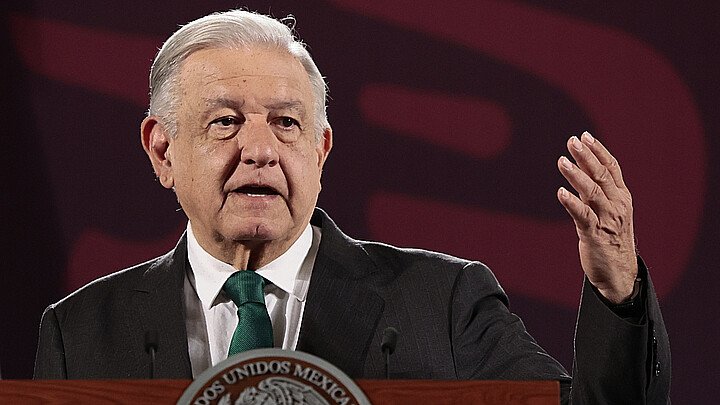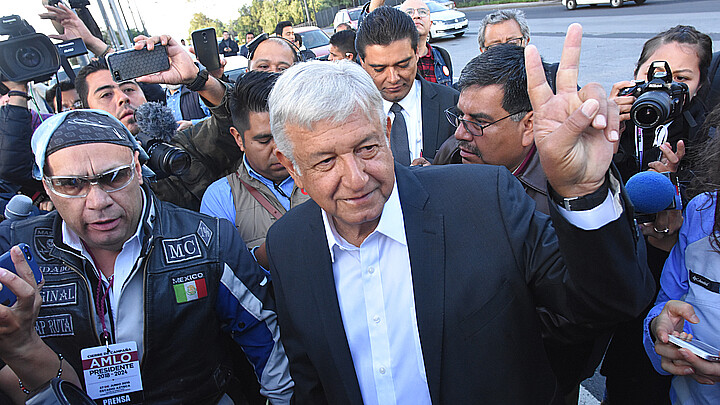Politics
SPECIAL REPORT: Is Mexico on a path towards militarization?
ADN America consulted experts to better understand the involvement of the Armed Forces in the administration of civil works
December 2, 2021 9:37am
Updated: December 2, 2021 2:54pm
In a speech commemorating the anniversary of the Mexican Revolution, Mexican Secretary of Defense General Luis Cresencio Sandoval said:
"As Mexicans, we must remain united in the national project that is underway. Because, far from the differences of thought that may exist, we are united by history, by the love for the land that gave us birth, and by the conviction that only by working towards the same objective will we be able to make the reality of Mexico more promising everyday.”
The general's words raised alarm bells across various sectors.
“During the Revolution Day celebration, General Sandoval, head of the Mexican Armed Forces, publicly supported and identified with AMLO and his political project. When the military gets into partisan politics, democracy is in jeopardy,” wrote José Miguel Vivanco, executive director of Human Rights Watch for the Americas, on Twitter.
The General’s speech also raised questions about the Mexican government’s relationship with the Armed Forces. ADN America spoke with experts in order to better understand the increased role of the Army and the Navy in Mexican politics.
Collapse of civil institutions
Javier Oliva Posada, a professor and researcher at UNAM's Faculty of Political and Social Sciences, considers that the use of the Armed Forces by President Andrés Manuel López Obrador is a response to political troubles.
"Now that the second part of his six-year term is about to begin, (López Obrador) is realizing that he may be running out of time to fulfill his plans. As in any contemporary democracy, the Armed Forces are not deliberative. For this reason, due to his style of governing, it becomes clear that the president must rely more and more on the Armed Forces, " Oliva told ADN América.
Regarding Sandoval's statement, Oliva notes that all defense officials must show support for the government because the president, in addition to being the main civil authority, is also the supreme commander of the Armed Forces, which implies that he is the only one empowered to give orders to the country's military bodies.
"Whoever arrives (to the presidency in 2024) will have the freedom to remove military leadership. The military is subordinate. There have been, however, incredible signals of loyalty towards the president. When López Obrador asked Sandoval, in front of the press, to reveal the names of those in charge of the national anti-narcotics policy, he forced Sandoval to put his subordinates at risk. But can you imagine if Sandoval had denied the president’s request? Right there is proof that the army is subordinate to the presidency,” Oliva recalls.
Oliva continues to explain that the peculiarity of the secretaries of defense and of the navy are that, as well as serving as secretaries of state, they also hold operational commands. In the current climate, this is a tiresome role.
"A lack of military personnell means that active duty members may now have less time to spend with their families or be exposed to greater dangers. The president announced that the military will now also be charged with the distribution of medicine, which might be too heavy of a burden for the Armed Forces,” the UNAM professor noted.
Continuation process
According to Samuel Storr from the Ibero-American University’s Citizen Security Program, the increased work load pushed on the military began during Vicente Fox’s six-year term between 2000-2006 and intensified under the leadership of Felipe Calderón between 2006-2012.
"There is always the possibility that the military will subdue civilian forces. I think that is why they say that they have never taken anything by force. We see militarization in a very different way," Storr told ADN América.
Under Calderón, the Armed Forces began to specialize in public security tasks. Since then, their influence has spread to other areas of public administration. Currently, they are in charge of the distribution of COVID-19 vaccines and the construction of public works, such as the new airport in Mexico City.
However, their participation in the creation of a national security strategy under previous governments is key to understanding the current extension of the Armed Forces and their power.
"Many years have passed since the deployment of the military was proposed as a temporary measure to restore order. But we have seen the opposite happening, because civilian forces have not expanded. Rather, there has been a targeted approach to purge and arm the military,” Storr notes.
In addition, the Armed Forces are increasingly more active in the formulation of laws. Salvador Cienfuegos, secretary of defense during the government of Enrique Peña Nieto (2012-2018), spoke out on several occasions in favor of the Internal Security Law. Although he did not directly lobby for the measures approval, it was a first step towards a process which currently allows General Sandoval to write a law which would put the National Guard in the hands of the Armed Forces.
"In the United States, civilian authorities have a tendency to delegate certain security tasks to the military. I think a bit of the same is happening in Mexico. When you think about the few incentives that exist at the political level to invest in police, to create security strategies and ensure that they are complied with, accepting military aid - something that also has pressure at the political level - becomes part of a vicious cycle,” Storr added.
Possible alternatives
Maria Elena Morera, president of Citizens for a Common Cause, agrees that the increased involvement of the military in the administration of public works is a political decision. However, she warns that the lack of transparency surrounding the resources currently handled by the secretaries of Defense and of the Navy are troublesome.
Funds for “The Mayan Train, the airport and the refinery necessarily pass through the coffers of the Armed Forces. I think this has to do with the amount of money that is entrusted to the Armed Forces, and at the end of the day, this is very dangerous. There is no transparency or accountability,” Morera warned in an interview with ADN America.
Morera notes that several accusations of corruption have already been filed during the construction of the new Mexico City airport. In this regard, she indicates that more serious problems may arise if the Armed Forces continue to manage resources without accountability.
"When you give something, it is hard to take it away. I think it will be difficult to strip the Armed Forces of their present responsabilities, although I also believe that they have too much on their plate to fulfill what is required of them. I think the next president will be faced with the dilemma of what the military can keep and what must be taken away,” Morera continued.
Morera also notes that the funds promised to strengthen the police force at the beginning of AMLO’s presidency have not been allocated. These funds were meant to train the National Guard, but plans have not panned out as expected. For this reason, Morera proposes several alternatives.
Among the main ones, she posits that the National Guard should be deployed to areas where there are few or no police officers. She also highlights the importance of strengthening local police forces throughout the country through a body designed to professionalize them in their tasks. In addition, she considers that other tasks – such as crime prevention and social rehabilitation – are key.
"We are not against the Armed Forces. We respect and admire them. For that reason, we want to work to preserve the institution – they are, after all, the last bastion that Mexico has,” she concluded.










